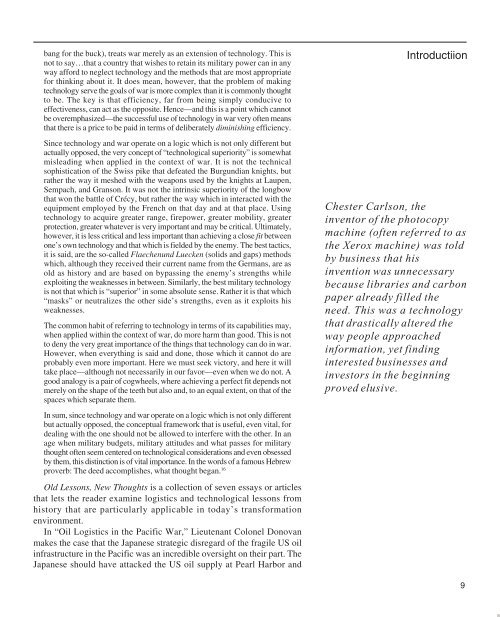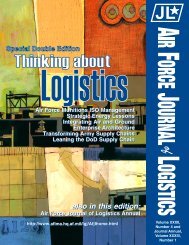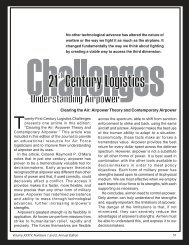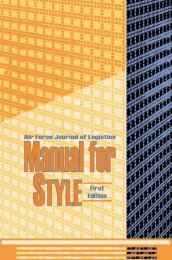Old Lessons, New Thoughts - AF Logistics Management Agency
Old Lessons, New Thoughts - AF Logistics Management Agency
Old Lessons, New Thoughts - AF Logistics Management Agency
Create successful ePaper yourself
Turn your PDF publications into a flip-book with our unique Google optimized e-Paper software.
ang for the buck), treats war merely as an extension of technology. This is<br />
not to say…that a country that wishes to retain its military power can in any<br />
way afford to neglect technology and the methods that are most appropriate<br />
for thinking about it. It does mean, however, that the problem of making<br />
technology serve the goals of war is more complex than it is commonly thought<br />
to be. The key is that efficiency, far from being simply conducive to<br />
effectiveness, can act as the opposite. Hence—and this is a point which cannot<br />
be overemphasized—the successful use of technology in war very often means<br />
that there is a price to be paid in terms of deliberately diminishing efficiency.<br />
Since technology and war operate on a logic which is not only different but<br />
actually opposed, the very concept of “technological superiority” is somewhat<br />
misleading when applied in the context of war. It is not the technical<br />
sophistication of the Swiss pike that defeated the Burgundian knights, but<br />
rather the way it meshed with the weapons used by the knights at Laupen,<br />
Sempach, and Granson. It was not the intrinsic superiority of the longbow<br />
that won the battle of Crécy, but rather the way which in interacted with the<br />
equipment employed by the French on that day and at that place. Using<br />
technology to acquire greater range, firepower, greater mobility, greater<br />
protection, greater whatever is very important and may be critical. Ultimately,<br />
however, it is less critical and less important than achieving a close fit between<br />
one’s own technology and that which is fielded by the enemy. The best tactics,<br />
it is said, are the so-called Flaechenund Luecken (solids and gaps) methods<br />
which, although they received their current name from the Germans, are as<br />
old as history and are based on bypassing the enemy’s strengths while<br />
exploiting the weaknesses in between. Similarly, the best military technology<br />
is not that which is “superior” in some absolute sense. Rather it is that which<br />
“masks” or neutralizes the other side’s strengths, even as it exploits his<br />
weaknesses.<br />
The common habit of referring to technology in terms of its capabilities may,<br />
when applied within the context of war, do more harm than good. This is not<br />
to deny the very great importance of the things that technology can do in war.<br />
However, when everything is said and done, those which it cannot do are<br />
probably even more important. Here we must seek victory, and here it will<br />
take place—although not necessarily in our favor—even when we do not. A<br />
good analogy is a pair of cogwheels, where achieving a perfect fit depends not<br />
merely on the shape of the teeth but also and, to an equal extent, on that of the<br />
spaces which separate them.<br />
In sum, since technology and war operate on a logic which is not only different<br />
but actually opposed, the conceptual framework that is useful, even vital, for<br />
dealing with the one should not be allowed to interfere with the other. In an<br />
age when military budgets, military attitudes and what passes for military<br />
thought often seem centered on technological considerations and even obsessed<br />
by them, this distinction is of vital importance. In the words of a famous Hebrew<br />
proverb: The deed accomplishes, what thought began. 16<br />
<strong>Old</strong> <strong>Lessons</strong>, <strong>New</strong> <strong>Thoughts</strong> is a collection of seven essays or articles<br />
that lets the reader examine logistics and technological lessons from<br />
history that are particularly applicable in today’s transformation<br />
environment.<br />
In “Oil <strong>Logistics</strong> in the Pacific War,” Lieutenant Colonel Donovan<br />
makes the case that the Japanese strategic disregard of the fragile US oil<br />
infrastructure in the Pacific was an incredible oversight on their part. The<br />
Japanese should have attacked the US oil supply at Pearl Harbor and<br />
Introductiion<br />
Chester Carlson, the<br />
inventor of the photocopy<br />
machine (often referred to as<br />
the Xerox machine) was told<br />
by business that his<br />
invention was unnecessary<br />
because libraries and carbon<br />
paper already filled the<br />
need. This was a technology<br />
that drastically altered the<br />
way people approached<br />
information, yet finding<br />
interested businesses and<br />
investors in the beginning<br />
proved elusive.<br />
9





